- Home
- Barbara W. Tuchman
Stilwell and the American Experience in China, 1911-45 Page 4
Stilwell and the American Experience in China, 1911-45 Read online
Page 4
The Academy, however, could not fill his horizon, the less so for being next door to home. Restless and inquiring, he requested leave for each of the summers of 1907, 1908 and 1909 to go “beyond the seas,” with Spanish as the excuse. With better luck than he had had when he applied for leave to improve his French, he succeeded in making three voyages to areas of Latin America. The first was at Government expense in the form of a “Confidential Mission” to make a topographical survey of Guatemala. Ordered to travel under an assumed name, carrying nothing that would reveal his identity or show him to be a Government agent, he was to fill in skeleton maps with an accurate rendering of the topography, and supply information on bridges, fords, ferries, railroads, roads, wagon carts, draft animals, harbors, landings, fortifications, telephone and telegraph lines, rivers, lakes, canals, cities, towns and villages, garrisons, occupation and density of population, food, fuel, forage, political conditions, diseases and climate. Six weeks were allowed for the mission.
Stilwell’s wanderings by foot and mule in Guatemala were full of discoveries. He found the country flea-bitten and unappetizing, fell ill with dysentery and fever and after a few weeks longed to go home. Yet he was constantly observing, filling his notebooks with facts and comments, finding himself stirred by the same aspects of oppression that were to become familiar in China. They evoked a sympathy with the common man and anger with his rulers that he would not have felt at home. The Guatemalteco, he noted, would not work more than he had to because everything he made was stolen by Government officials who were often “thieves and even worse.” Stilwell formed a very “unfavorable opinion” of the officials, landowners and professional classes. Keeping the peasant illiterate and uneducated, he wrote, “suits very well the purpose of the Government which takes him from his farm at any time and puts him in the Army for an indefinite period, not caring whether or not his family starves. Yet…he says nothing, enduring it all in silence.” These were sentiments that were to repeat themselves in China. As a close friend said, “Stilwell was liberal and sympathetic by instinct. But he was conservative in thought and politics.”
The next year, 1908, he spent his summer leave traveling through Mexico with a friend and classmate, Lieutenant Francis Honeycutt, nicknamed “Hungry.” They made a militant pair for Honeycutt was reputed to be the best swordsman in the Regular Army while Stilwell, who had qualified as expert marksman and member of the Army rifle team, was reported by a contemporary newspaper to be “one of the 20 premier rifle shots in the United States.” Starting in Washington, they visited the War College and the Congressional Library, “which is a peach,” Joe noted, giving it his highest praise. Things he really liked were “peachy.”
In Mexico they traveled on foot and horseback for two weeks while Joe made copious notes on Mexican culture, history, customs, agriculture, religion and Aztec hieroglyphics. After their return home via Cuba he and Hungry carried the Mexican theme to a costume party at Lake Placid at which they appeared “dressed as 2 femmes with bare legs and bellies. Made quite a hit as Montezuma’s daughters.” The party was the highlight of a fortnight of fun in the Adirondacks in August which finished off their leave. They charged without pause through picnics and tennis, hikes and dances, sports with friends and jaunts with girls. Containing for once no caustic comments, the diary recorded a rare acknowledgment of a good time among “fine people, cordial and friendly.”
Just before leaving for Mexico, Stilwell at twenty-five had met the girl he was going to marry. She was Winifred A. Smith of Syracuse, a classmate at boarding school of his younger sister Mary. So far, except for a girl whose picture he had carried to the Philippines (with the approval of his parents who believed it would “help to keep him straight”), Joe had had no serious romances. Not the shadowy girl of the photograph, but his sister, then only thirteen, had been his date at the West Point Hop in the year he graduated. Now returning the compliment, Mary invited him to her school’s June dance and asked him to bring Hungry along for her friend Win, a very pretty young lady of nineteen with vivacious eyes and curly hair.
Lieutenant Honeycutt wore elegant blues with the red stripe of the Field Artillery, but it was Mary’s brother in starched summer whites to whom Win was more attracted. She thought she had “never met anyone so handsome or with such wonderful deep brown eyes.” They felt happy together and he asked if he could write. A year later he invited her to the Officers’ Hop at West Point but her mother, suspicious of Army men, refused permission. He came, however, to her graduation dance at finishing school and later, chaperoned by her mother, she visited the Point and met his family. A letter from him addressed “Sweet Peach” embarrassed her but in the spring of 1910, after she attended the Hop of that year, they became engaged and were married in October. In a letter to her before the wedding he wrote, “I will love you more as my wife than I ever have as my fiancée—lots more….I am going to do my very best to take care of you and make you happy. But I am very far from perfect. I’ll want your help many times—when I get impatient, grouchy, gloomy….If at times I am unbearable please remember, dear, that I’ll come out of it and that my one wish will always be your happiness. For I love you with all that is in me.”
Even in love Stilwell had not been content to stay home but, moved by his annual yearning to go “beyond the seas,” had spent his summer leave of 1909 in Central America, and in 1910 had again applied for a topographical mission for the months between his engagement and marriage. Citing his qualifications in Spanish and previous experience in a letter to the War Department, he stated combatively if somewhat obscurely that he was indifferent to the nature of the work “so long as it takes me to those countries in the interests of the United States and against them.” Despite these fighting sentiments the request was disapproved by both the State Department, which wished to avoid complications owing to “the late friction” with Nicaragua, and the Chief of Staff, who objected rather cryptically to sending young officers on these missions “on account of the effect it has had upon some of those who have been there in the past.”
Shortly before his marriage Stilwell had been caught up in the new rules enforcing rotation between detached service and regimental duty. These required that in peacetime line officers under the rank of major must serve two years out of every six with their regiments. Designed to limit tours of detached service in Washington to four years, the rules were codified by act of Congress in 1912 and thereafter were known as the Manchu Act in tribute to the common uprooting of Army bureaucrats from Washington and Manchus from Peking. Stilwell’s first term with the 12th Infantry being found short of the requirements, he was reassigned to his regiment and sailed with his wife for the Philippines on the transport Sherman in January 1911.
His second tour in the Islands proved to be routine post duty at Fort William McKinley, a trolley ride from Manila. Marked only by his promotion to first lieutenant in March, it was a daily round of drill which the company could do with its eyes closed, of garrison school which succeeded in killing time until 1 P.M., and of efforts to vent unused energy in organizing boat races in native bancas for his men and teaching them to build bamboo bridges over the river. With his eye on the current revolution in Mexico, he agitated for transfer to “activities” on the border but without success. By September, having three months’ accumulated leave saved up, he determined to spend it seeing more of the Orient with his wife before she was to go home to await the birth of their first child.
They sailed for Japan on September 14, arriving at Nagasaki from where they toured the shores of the Inland Sea as far as Hiroshima. Stilwell raced up every mountain in sight. After climbing to the top of Miyajima in an hour and a half, he recorded “the guide’s admiration for my legs knew no bounds.” In the next six weeks, pulled by his endless curiosity and energy, he and Win saw Japan intensively. He began at once to learn the language, causing titters at a railroad station when he asked to buy milk. Checking in the dictionary later, he found he had asked for “mother’s mi
lk.” His recorded comments were exhaustive but at this stage of his acquaintance with Japan they were confined to descriptions without judgments or opinions.
Although the newspapers were full of the startling events of the Revolution in China, Stilwell was evidently too absorbed to notice, for his diary makes no mention of them. He saw his wife off for the United States in mid-November and continued on to see China by himself.
2
Visitor to Revolution: China, 1911
STILWELL ENTERED at Shanghai, epitome and greatest of the Treaty Ports. His first sight was of the fleet of foreign warships—two Japanese, two French, one British, one German and one American—riding the coffee-colored waters of the harbor not as visitors but as occupants. Developed by foreign enterprise, the great metropolis and business capital of China was governed in major part as a concession under foreign control. It lay at the mouth of the Yangtze, central artery of the country and busiest river in Asia; half of China’s industry was contained within its limits and half of China’s trade passed over its wharves. Stilwell saw his first rickshaw at Woosung and sampans and sailing junks in the river. Coming into Shanghai proper, his first impression was “a shock,” as it was to most foreigners on arrival who, unconsciously expecting something Oriental and exotic, saw instead the solid hotels and banks, the broad streets and parks of a Western-style city. From the hotel window Stilwell thought it looked like Philadelphia. In the streets of the International Settlement he was struck by the tall turbaned Sikhs imported from British India who served as police.
The Revolution added a touch of excitement for Stilwell without seriously inconveniencing him, for like most momentous upheavals it was less noticeable to the eyewitness than it would be to history. On a tour of the Old Chinese City he saw rebel recruiting stations under the flag of the Revolution whose twelve-pointed black sun on a red ground had replaced the Imperial yellow dragon. He talked with some of the soldiers, noting that they carried Chinese-made Mausers and seemed “fine-appearing lads.” He saw beggars thick as flies lying in rags in the gutters, vile, filthy canals clogged with refuse, a coolie taking a mountain of trunks from wharf to hotel for 30 cents, a street vendor selling oranges by the section, mourners dressed in white in a temple, “dames of fortune lined up in the doorway under a light, gaily dressed and be-jewelled but solidly listless faces.” Visiting an old teahouse dating from the Ming dynasty, he noted that the bridge leading to it was built in zigzag form to thwart evil spirits who, unable to maneuver angles according to Chinese belief, would fall into the water at the turns. Elsewhere observing the number of gods and shrines in all the houses, he remarked that the main point of religion in China “seems to be an effort to scare away evil spirits who are continually trying to do them harm.”
By chance or perspicacity he had hit upon a central fact of Chinese life—fear of Feng shui, the demons, ghosts and devils who bring evil upon men. Foreigners, as indicated by the term “foreign devil,” sometimes modified by “long-nosed” or “hairy,” were associated in Chinese minds with evil spirits. The instinct of China had been to keep her precincts immune from foreign infection. The Manchu Empire before 1898 had no Ministry of Foreign Affairs to conduct relations with other countries because no such relations had been wanted or considered necessary. Aliens desiring to trade, preach or otherwise establish contact had been dealt with by the Hall for Governance of Barbarians.
Throughout her history China had believed herself the center of civilization, surrounded by barbarians. She was the Middle Kingdom, the center of the universe, whose Emperor was the Son of Heaven, ruling by the Mandate of Heaven. Convinced of their superior values, the Chinese considered that China’s greatness was owed to principles of social order formulated by her sages and administered benevolently by a learned elite over a harmonious whole. All outsiders whose misfortune was to live beyond her borders were “barbarians” and necessarily inferiors who were expected, and indeed required, to make their approach, if they insisted on coming, bearing tribute and performing the kowtow in token of humble submission.
From Marco Polo to the eighteenth century, visiting Westerners, amazed and admiring, were inclined to take China at her own valuation. Her recorded history began in the third millennium B.C., her bronzes were as old as the pyramids, her classical age was contemporary with that of Greece, her Confucian canon of ethics predated the New Testament if not the Old. She was the inventor of paper, porcelain, silk, gunpowder, the clock and movable type, the builder of the Great Wall, one of the wonders of the world, the creator of fabrics and ceramics of exquisite beauty and of an art of painting that was sophisticated and expressive when Europe’s was still primitive and flat.
Vast and grand and faraway, a land of dragon-roofed temples, bridges of marble, terraced rice fields and many-tiered pagodas, dominated by a fabulous monarch and splendid court, supported by a limitless mass of hard-working laborers, unravaged by the religious wars of the West, ancient and supreme outside the Christian sway, boasting a love of order, respect for learning and contempt for war, she was reported by European travelers as a kind of utopia which seemed indeed, as her philosophers claimed, to have found the secret of rational government. In that case the paradox of mass penury was puzzling. Some observers were troubled too by the recurring phenomenon of corruption and dynastic decay and by evidence of a culture that was endlessly turning like a wheel without gears in the grooves of the past. But such doubts did not greatly disturb the Western habit of idealizing China to suit Western theories of a particular time.
When at the end of the eighteenth century Western ships and merchants surged against China’s shores, eager for tea and silk and cotton, they found no reciprocal enthusiasm. Enclosed in the isolation of superiority, Imperial China wanted no influx of strangers from primitive islands called Britain or France or Holland who came to live off the riches of the Middle Kingdom bearing only worthless articles for exchange. They had ugly noses and coarse manners and wore ridiculous clothes with constricting sleeves and trousers, tight collars and coats that had tails down the back but failed to close in front. These were not the garments of reasonable men.
A past-oriented society, safe only in seclusion, sensed a threat from the importunate West. The Imperial Government raised every barrier possible by refusals, evasions, postponements and prohibitions to foreign entry or settlement or the opening of formal relations. Splendidly remote in the “Great Within” of the Forbidden City of Peking, the court refused to concern itself with the knocking on its doors. It would admit foreign embassies who came to plead for trade treaties only if they performed the ritual of three genuflections and nine prostrations in approaching the Son of Heaven. British envoys, after surmounting innumerable obstacles to reach Peking, balked at the kowtow and turned back empty-handed.
Since Western merchants paid in silver for Chinese goods they were not banned altogether. Under a set of regulations designed to bar their intrusion but not their money, they were confined to the southernmost port of Canton, as far as possible from the capital at Peking, and were required to do business from “factories”—a combination of dwelling, office and warehouse—outside the city walls. To discourage their permanent settlement they were not allowed to bring in their women. To keep them from learning the language it was made illegal for Chinese to serve them as teachers.
Even so the trade grew—to be paid for, fatefully, in opium. The demand in Europe and America for tea and chinoiserie made the traders’ prospects rich but a one-sided exchange of money for goods could not expand profitably. The foreigners had little to bring that the Chinese wanted until they introduced opium grown in India and Persia. As the Chinese demand spread, the drug became the main cargo of shippers licensed by the British East India Company as well as of American clipper trade which followed in its wake. Fortunes were made, commerce multiplied and British rule in India came to depend on the income.
The Chinese too grew rich on the trade although they declared it illegal. Dealers and middlemen took
their commissions and officials at every level took a consideration for administering permissively the grand fraud. They surrounded the smuggling with an elaborate pretense of pursuit, chasing the clipper ships at a safe distance and firing loud cannonades, duly reported to the distant Emperor as victories. In the context of the East where form rather than substance is the reality, these engagements satisfied the Chinese requirement of face. Lush in opportunities, the opium trade extended the deepening corruption of the Manchu regime. The Westerners, pricked now and then by a sense of shame, found it could be subdued by counting the gains. For both sides the vast masquerade was not a good school of mutual respect.
Out of this situation came the Opium Wars of 1839–42 and 1856–60, the matrix of intercourse thereafter between China and the West. Because of the loss of customs revenue, the growing ill effects of opium-smoking among the people, and the fear that the cordon against foreigners was breaking down, the Imperial Government decided that the opium trade must be brought to an end. The British, eager to sell their cotton and other manufactured goods, were pressing for the opening of other ports and for the right of trade to be confirmed by treaty. Basically the issue was not simply opium but the fact that the Chinese wanted to restrict, and the West to expand, their intercourse. The West prevailed.
Against British armed frigates China’s antiquated coastal cannon, left to rust by Manchu ineptitude, were useless. The First Opium War ended in the Treaty of Nanking which in effect opened China to the West and broke ground for all foreign inroads thereafter. Besides ceding Hong Kong in perpetuity, it opened five coast towns from Canton to Shanghai, later known as Treaty Ports, where the British could maintain homes (with wives), establish consulates and courts to try their own law violators under their own laws, and carry on trade under a fixed tariff of 5 percent. The Second Opium War, in which Imperial forces armed with spears were defeated by an Anglo-French expeditionary force outside Peking, confirmed and extended the principle of extraterritoriality. Foreigners gained access to ten more Treaty Ports and the right to navigation of the Yangtze and to travel anywhere in China. They were yielded the awesome right of diplomatic representation and residence in Peking and the right of missionaries to own property outside the Treaty Ports. In final submission opium was legalized. America and Russia shared in negotiation of the treaties if not in the active belligerence. Throughout the process of the opening of China, the United States followed through portals cut by the British, avoiding the aggression and inheriting the advantages.

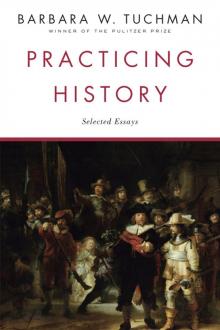 Practicing History: Selected Essays
Practicing History: Selected Essays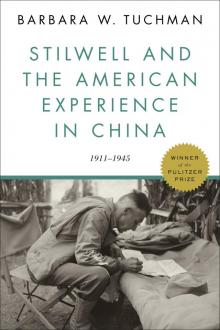 Stilwell and the American Experience in China, 1911-45
Stilwell and the American Experience in China, 1911-45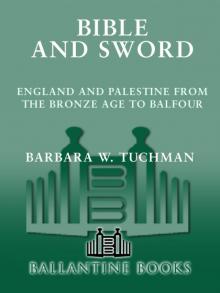 Bible and Sword: England and Palestine From the Bronze Age to Balfour
Bible and Sword: England and Palestine From the Bronze Age to Balfour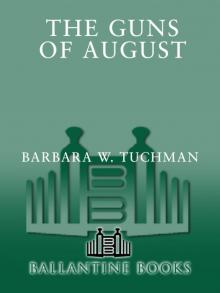 The Guns of August
The Guns of August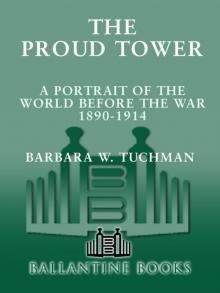 The Proud Tower: A Portrait of the World Before the War, 1890-1914
The Proud Tower: A Portrait of the World Before the War, 1890-1914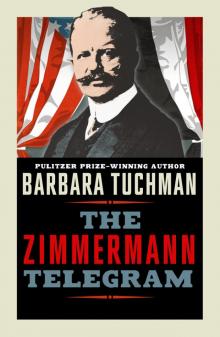 The Zimmermann Telegram
The Zimmermann Telegram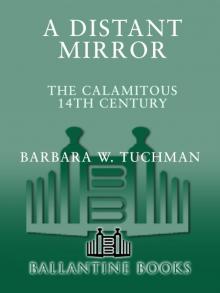 A Distant Mirror: The Calamitous 14th Century
A Distant Mirror: The Calamitous 14th Century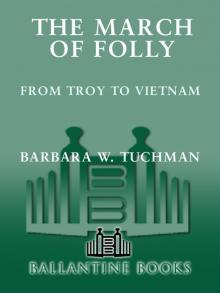 The March of Folly: From Troy to Vietnam
The March of Folly: From Troy to Vietnam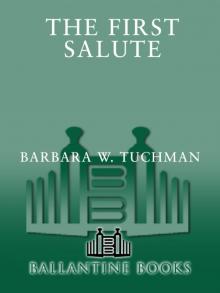 The First Salute
The First Salute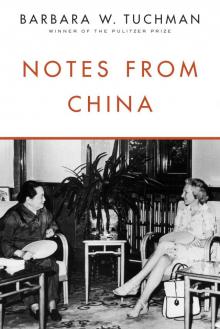 Notes From China
Notes From China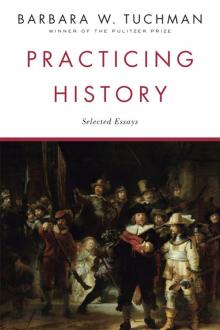 Practicing History
Practicing History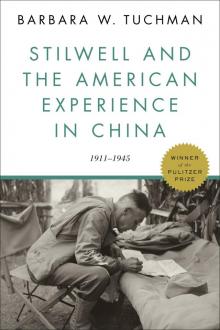 Stilwell and the American Experience in China
Stilwell and the American Experience in China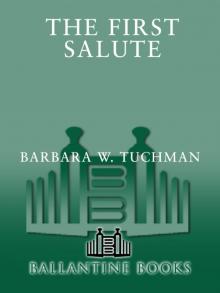 First Salute
First Salute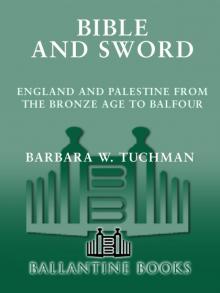 Bible and Sword
Bible and Sword